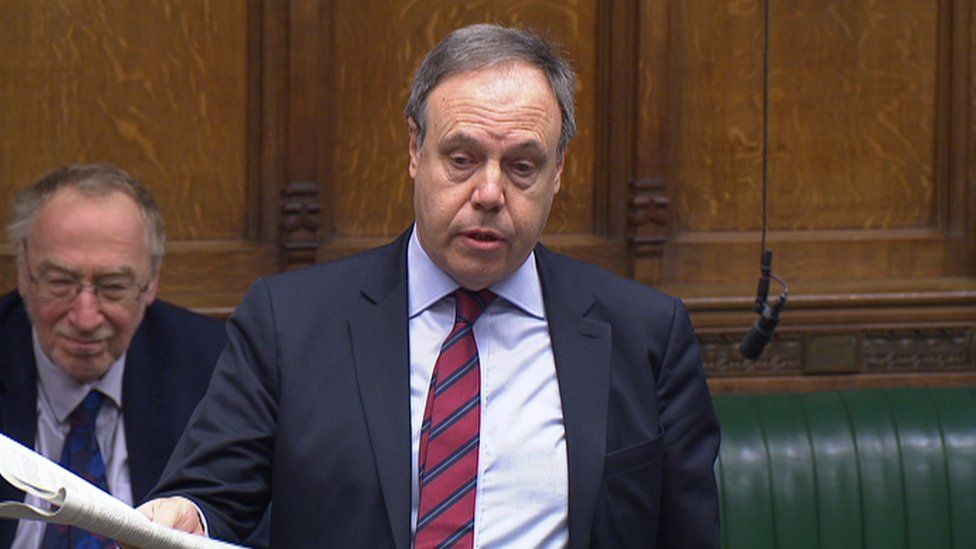DUP accuses No 10 of 'hiding' over Brexit
- Published
- comments

The DUP has accused the government of having "something to hide" by not publishing the full legal advice it has received on the Brexit deal.
During an urgent question in the Commons, the solicitor general said the government would publish a "full reasoned statement" soon.
The attorney general will also answer MPs' questions in Parliament on Monday.
But the DUP's deputy leader, Nigel Dodds, said the Commons had already rejected the government's offer.
He said ministers were simply repeating the proposal that was made during a debate on the motion earlier this month.
'Start listening'
The DUP's MPs supported that motion - despite the confidence-and-supply arrangement it shares with the government.
Speaking in the Commons on Thursday, Mr Dodds said: "Why doesn't the solicitor general and the government start listening? That has been the problem all along."
"What has the government got to hide?"
Solicitor General Robert Buckland denied the claim, adding: "This is not an instance where the government seeks to delay or hide, this is about providing information at the right time."
A number of other MPs have expressed concerns that they will not be able to go through the legal advice in time before the vote on the government's Brexit deal.
The DUP has said Theresa May's Brexit plan is "worse than no deal", and has vowed to vote against it when the meaningful vote takes place on 11 December.
It has put a question mark over the future of the confidence-and-supply deal with the Conservative Party.
What is the confidence-and-supply arrangement?
The Conservative Party entered into the pact with the DUP after the general election in 2017, in order to give the prime minister a working majority in the Commons.
The DUP agreed to support the government on all Brexit votes, finance bills and the Budget and a number of other areas in exchange for an extra £1bn in spending for Northern Ireland.
But the fallout over Brexit has put the parties' relationship under significant strain - with the DUP abstaining and voting against the government last week during a budget vote, in a bid to warn the government to change course on Brexit.
Why is NI important in all of this?
Northern Ireland was the main sticking point in the Brexit negotiations, as the UK and EU were at odds over how to ensure no hard border - physical checks or infrastructure - between Northern Ireland and the Republic of Ireland after Brexit.
Both sides have said they hope to ensure a solution is found as part of a wider trade deal, which keeps trade as frictionless as it is now.
But in the absence of that, the EU wanted an insurance policy in the legally binding withdrawal agreement: the backstop.
What will become of the Irish border when the UK leaves the European Union?
The agreement on the backstop would see only Northern Ireland stay aligned to some EU rules, if it took effect.
That means some goods coming into Northern Ireland from Great Britain would face extra checks to see if they met EU standards.
But the UK government and EU insist it is only an insurance policy in the event that there is no breakthrough by the end of the transition period.
What has the DUP said about the deal?
The DUP has always said its one red line was the backstop.
It is concerned that the backstop could threaten the integrity of the union by placing a trade border down the Irish Sea.
The party's leader Arlene Foster has insisted there is still time to work for a "better deal" and has criticised Theresa May for "wasting time" trying to build support for the plan, when it is unlikely to get enough support from MPs in a matter of weeks.
What is the prime minister saying?
The prime minister visited Northern Ireland on Tuesday as part of her two-week push to sell her agreement.
She has urged the DUP to "think about the national interest" when considering her Brexit deal.
On Thursday, Mrs May appeared before a Westminster committee to answer questions about the government's plan.
Allow Twitter content?
This article contains content provided by Twitter. We ask for your permission before anything is loaded, as they may be using cookies and other technologies. You may want to read Twitter’s cookie policy, external and privacy policy, external before accepting. To view this content choose ‘accept and continue’.
She was asked if she will still have the support of the DUP if her deal is voted through Parliament, to which Mrs May did not directly answer the question, but said: "They have said themselves that the confidence and supply arrangement remains in place."
She also warned that political declarations are "not guarantees" when it comes to avoiding a hard border if her Brexit deal is rejected, and faced tough questioning from other MPs about the Northern Ireland backstop.
- Published16 October 2019
- Published15 October 2018
- Published18 October 2018
- Published25 November 2018